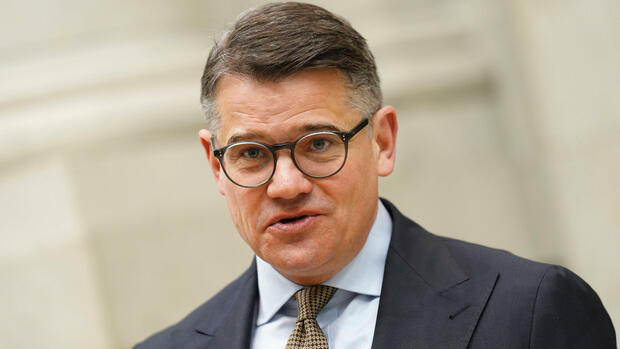The CDU politician sees an urgent need for action in financing the costs of refugees.
(Photo: IMAGO/Political Moments)
Berlin The Hessian Prime Minister Boris Rhein (CDU) has spoken out in favor of aligning the financing of refugee costs by the federal government with the number of new arrivals. “The federal government has to return to a so-called tip billing, which means: instead of a lump sum for the states, billing is per capita again,” Rhein told the Handelsblatt.
The more refugees come, the more money there is. “Such a breathing system is necessary in order to be able to react appropriately to a sharp increase in the number of refugees,” emphasized Rhein. The CDU politician sees an urgent need for action. “Municipalities urgently need more money from the federal government for accommodation, but also a clear commitment that the limits of their resilience are recognized and recognized,” he said.
The federal government has so far rejected further financial support, pointing to the responsibility of the federal states. On Wednesday, Chancellor Olaf Scholz (SPD) will meet the 16 Prime Ministers in the Chancellery. The background to this is the significantly increased number of arriving migrants and refugees in recent months.
In an internal paper, the federal government points out that the federal government already assumed most of the costs for war refugees from Ukraine, refugees and migrants last year and will do so again in 2023 anyway – although the supply is actually largely a matter for the federal states may be.
The total costs for the federal government in 2023 would be around 15.6 billion euros. In addition, the federal government will permanently relieve the municipalities of four billion euros in the costs of accommodation. The federal government accuses the federal states of not passing on money to local authorities and not ensuring that all immigration offices are digitized, which is why the processing times for asylum applications have been significantly delayed.
Brandenburg’s Prime Minister Woidke wants to expand the list of safe countries of origin
The German Association of Towns and Municipalities calls for a “restart in migration policy”. Many municipalities have long since reached their capacity limits when it comes to accommodation, integration or the creation of daycare and school places, said managing director Gerd Landsberg to the Handelsblatt. Therefore, one must come to a reduction in the number of refugees.
In an internal paper, the federal government points out that the federal government already assumed most of the costs for refugees from Ukraine last year.
(Photo: dpa)
From Landsberg’s point of view, the necessary measures include a fair distribution of refugees in Germany and Europe, better protection of the EU’s external borders and the consistent repatriation of people who are obliged to leave the country. “In addition, the pressure on the countries of origin, which do not want to take back their citizens who are obliged to leave the country, must be increased,” warned the head of the association of cities.
Landsberg also called for a “significant expansion” of the catalog of “safe countries of origin”. Such countries are generally believed to be free of political persecution and inhumane punishment or treatment. This should enable faster asylum decisions and deportations.
The President of the German District Association, Reinhard Sager, called on the federal government to classify Georgia, Morocco, Algeria and Tunisia as safe countries of origin. “At this point, we finally have to make consistent progress,” Sager told the Handelsblatt.
“At the same time, the federal and state governments must act more effectively when it comes to returning foreigners who are required to leave the country and must not put the issue on the back burner or play it down.” The federal government can do more, for example in the procurement of passports.
The country heads also called for movement on the issue of safe countries of origin. “Outdated positions that are no longer appropriate” must now be discussed again, said Hesse’s Prime Minister Rhein.
He considers it dangerous to leave the federal states and local authorities alone on this issue in the current situation. “This can lead to the radical forces taking control of this issue,” warned the CDU politician. It is therefore essential to control and limit migration.
>> Read also: Asylum turnaround of the federal government: Faeser calls for fast-track procedures at the EU’s external border
Brandenburg’s Prime Minister Dietmar Woidke is also calling for a rethink here. He will again propose to his coalition partners, the CDU and the Greens, to expand the list of safe countries of origin. “At some point, debates have to end,” Woidke told Handelsblatt.
More: “Calls for help are dismissed by the traffic light government” – Union increases pressure on the coalition with its own refugee summit

